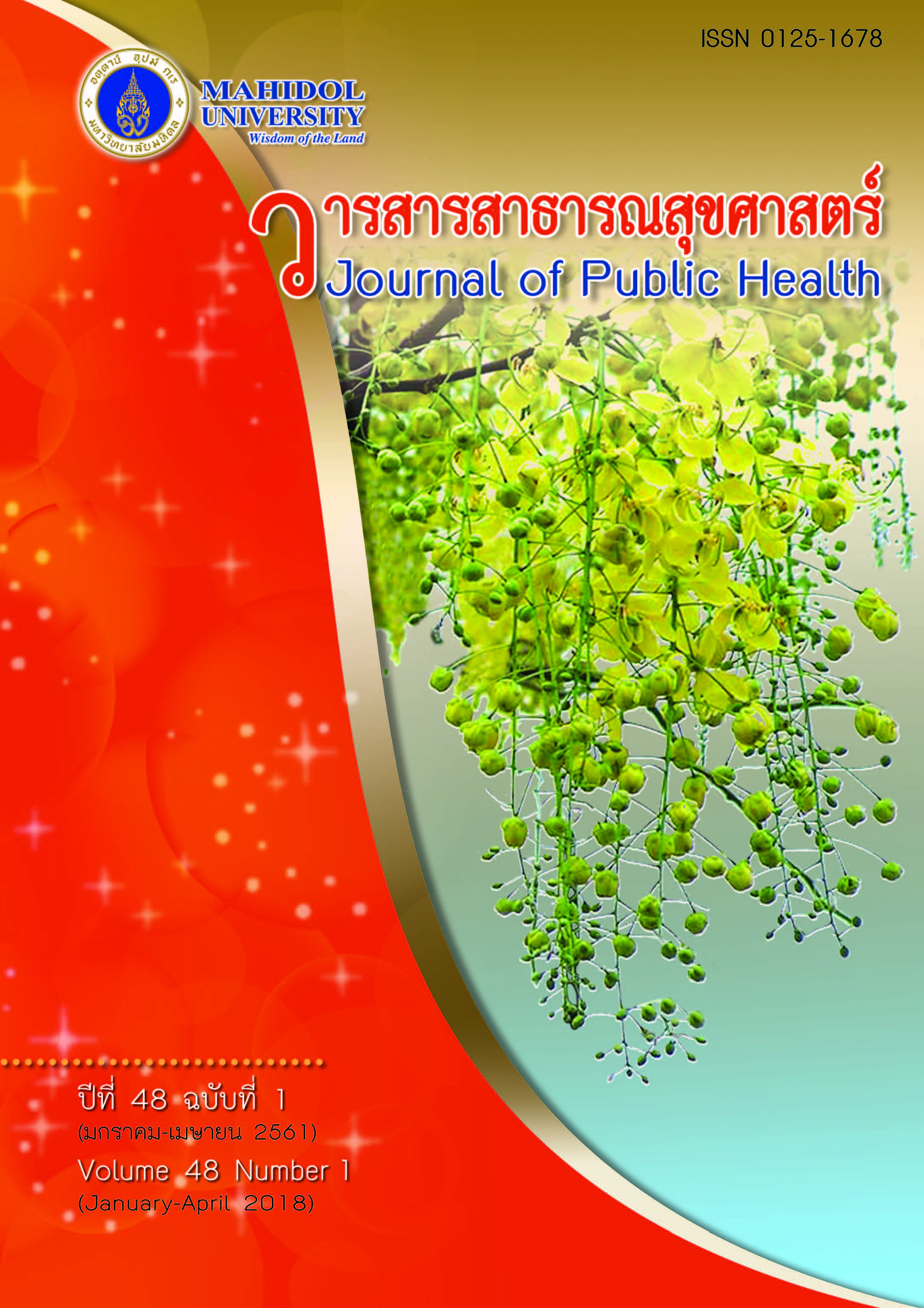ผลของโปรแกรมการมีส่วนร่วมของครอบครัวในการจัดการปัญหาการใช้ยาต่อพฤติกรรมการใช้ยาของผู้สูงอายุโรคเรื้อรังในชุมชน
Keywords:
family participation, drug use program, drug use behaviors, older adults with chronic disease, การมีส่วนร่วมของครอบครัว, ปัญหาการใช้ยา, พฤติกรรมการใช้ยา, ผู้สูงอายุโรคเรื้อรังAbstract
การวิจัยแบบกึ่งทดลองนี้ วัตถุประสงค์เพื่อศึกษาผลของโปรแกรมการมีส่วนร่วมของครอบครัวในการจัดการปัญหาการใช้ยาต่อพฤติกรรมการใช้ยาของผู้สูงอายุโรคเรื้อรังในชุมชน กลุ่มตัวอย่างเป็นผู้สูงอายุโรคความดันโลหิตสูงและ/หรือโรคเบาหวาน และสมาชิกในครอบครัวที่ดูแลผู้สูงอายุด้านการใช้ยา อำเภอพุนพิน จังหวัดสุราษฎร์ธานี สุ่มกลุ่มตัวอย่างตามเกณฑ์ 60 คน เข้ากลุ่มทดลองที่ได้รับโปรแกรมการมีส่วนร่วมของครอบครัวในการจัดการปัญหาฯ 30 คน มีกิจกรรม การสื่อสาร การตัดสินใจ และการกระทำร่วมกันด้านการจัดการปัญหาการใช้ยา ให้ความรู้ และฝึกทักษะการจัดยา ในสัปดาห์ที่ 1-6 โทรศัพท์ 1 ครั้ง ในสัปดาห์ที่ 7 กลุ่มควบคุมได้รับการดูแลตามปกติ 30 คน เก็บข้อมูลด้วยแบบสอบถามข้อมูลส่วนบุคคลและแบบประเมินพฤติกรรมการใช้ยา วิเคราะห์ข้อมูลด้วยสถิติเชิงพรรณาและทดสอบค่าที พบว่า กลุ่มทดลองมีคะแนนเฉลี่ยพฤติกรรมการใช้ยาหลังได้รับโปรแกรมฯ (= 51.33, SD=1.65) สูงกว่าก่อนได้รับโปรแกรมฯ (
= 41.87, SD=2.84) อย่างมีนัยสำคัญทางสถิติ และกลุ่มทดลองมีคะแนนเฉลี่ยพฤติกรรมการใช้ยา หลังได้รับโปรแกรมฯ (
= 51.33, SD=1.65) สูงกว่ากลุ่มควบคุม (
=41.13, SD=2.66) อย่างมีนัยสำคัญทางสถิติ ผลการวิจัยนำมาพัฒนาแนวทางส่งเสริมครอบครัวให้มีส่วนร่วมในการจัดการปัญหาการใช้ยาของผู้สูงอายุ เพื่อให้มีพฤติกรรมการใช้ยาที่เหมาะสม
Effects of a Family Participation Program in Managing Drug Managing Drug Use Behaviors among Older Adults with Chronic Disease in Phun Phin Community
This quasi-experimental research aimed to examine the effects of a family participation program in managing drug use concerning drug use behaviors among older adults with chronic disease in community. The sample comprised older adults with hypertension or diabetes and family members who care for older adults concerning drug use in Phun Phin District, Surat Thani. A total of 60 participants were selected in the study according to inclusion criteria. Thirty participants were randomly assigned to an experimental group participating in the family participation program to manage their drug use, dealing with decision-making and collaborative activities in drug problem management, knowledge acquisition, and skills training. The other 30 participants in the control group received normal care. Weekly, 1-6 phone calls were made and at week 7, data were collected using a demographic questionnaire and drug use behaviors assessment form. Data were analyzed using descriptive statistics and t-test. The results revealed that the experimental group had a significantly higher mean score (= 51.33, SD=1.65) than before receiving the program (
= 41.87, SD=2.84). The experimental group had a mean score on drug behavior that (
= 51.33, SD=1.65) was significantly higher than the control group (
= 41.13, SD=2.66) after the program. The results of this study can be used as guidelines for family participation in managing drug use.
Downloads
Published
Issue
Section
License
Creative Commons License CC-BY-ND


